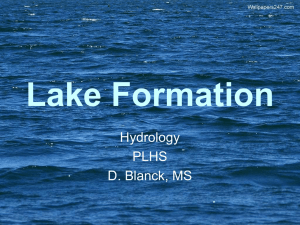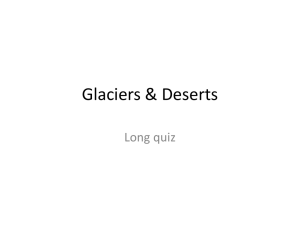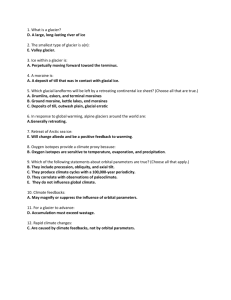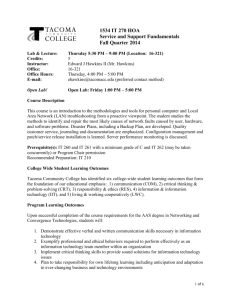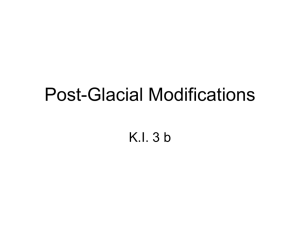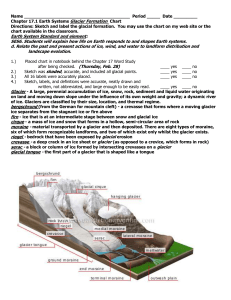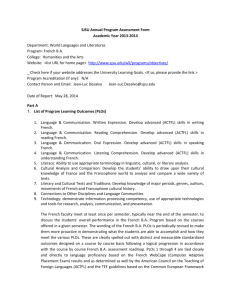Classroom behavior
advertisement
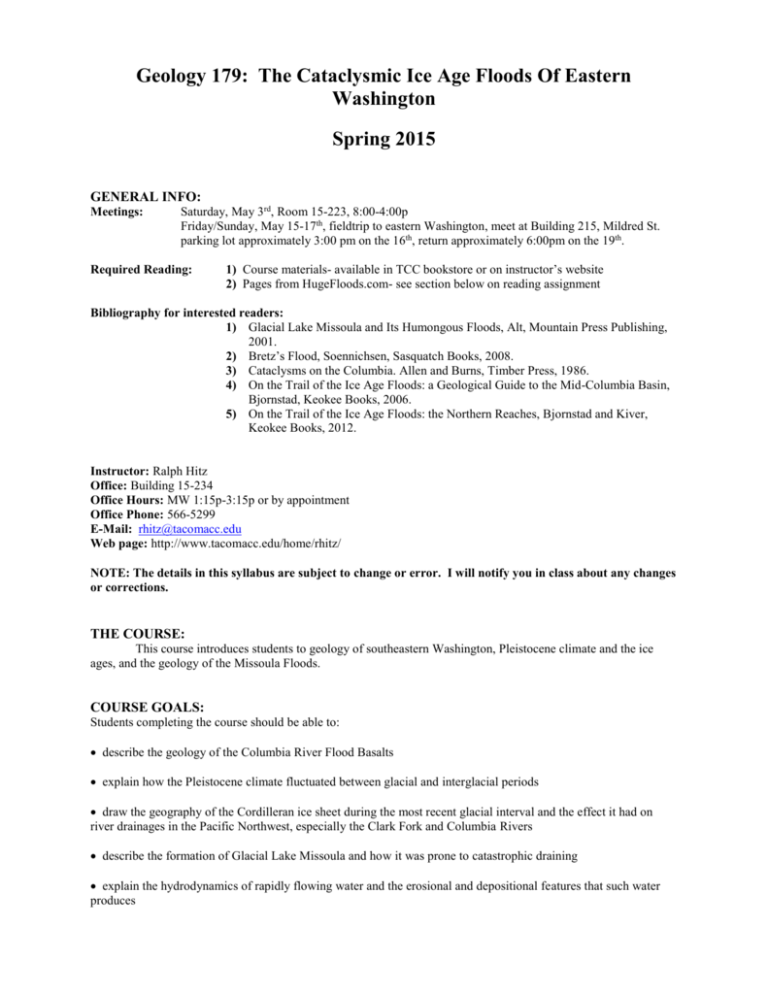
Geology 179: The Cataclysmic Ice Age Floods Of Eastern Washington Spring 2015 GENERAL INFO: Meetings: Saturday, May 3rd, Room 15-223, 8:00-4:00p Friday/Sunday, May 15-17th, fieldtrip to eastern Washington, meet at Building 215, Mildred St. parking lot approximately 3:00 pm on the 16th, return approximately 6:00pm on the 19th. Required Reading: 1) Course materials- available in TCC bookstore or on instructor’s website 2) Pages from HugeFloods.com- see section below on reading assignment Bibliography for interested readers: 1) Glacial Lake Missoula and Its Humongous Floods, Alt, Mountain Press Publishing, 2001. 2) Bretz’s Flood, Soennichsen, Sasquatch Books, 2008. 3) Cataclysms on the Columbia. Allen and Burns, Timber Press, 1986. 4) On the Trail of the Ice Age Floods: a Geological Guide to the Mid-Columbia Basin, Bjornstad, Keokee Books, 2006. 5) On the Trail of the Ice Age Floods: the Northern Reaches, Bjornstad and Kiver, Keokee Books, 2012. Instructor: Ralph Hitz Office: Building 15-234 Office Hours: MW 1:15p-3:15p or by appointment Office Phone: 566-5299 E-Mail: rhitz@tacomacc.edu Web page: http://www.tacomacc.edu/home/rhitz/ NOTE: The details in this syllabus are subject to change or error. I will notify you in class about any changes or corrections. THE COURSE: This course introduces students to geology of southeastern Washington, Pleistocene climate and the ice ages, and the geology of the Missoula Floods. COURSE GOALS: Students completing the course should be able to: describe the geology of the Columbia River Flood Basalts explain how the Pleistocene climate fluctuated between glacial and interglacial periods draw the geography of the Cordilleran ice sheet during the most recent glacial interval and the effect it had on river drainages in the Pacific Northwest, especially the Clark Fork and Columbia Rivers describe the formation of Glacial Lake Missoula and how it was prone to catastrophic draining explain the hydrodynamics of rapidly flowing water and the erosional and depositional features that such water produces describe the landscape features of eastern Washington that Harlan Bretz first recognized as the result of massive flooding; these include coulees, ripples, dry falls, potholes, erratic, and rhythmites explain the concept of uniformitarianism and how it aids geologists in generating knowledge about the earth’s past READING ASSIGNMENT Read the following pages on the website HugeFloods.com. Read all the text on each page. Videos are optional but I think they are valuable and interesting. As you read take notes on the topics listed below each page title. At our first meeting we will have a short answer/multiple choice format quiz on these topics. The quiz won’t be highly detailed but I do want you to know the basic content of the general topic of the ice age floods before we start class. The Mystery J. Harlan Bretz Columbia Gorge Lake Condon Willamette Valley flooding Lake Missoula Formation of Glacial Lake Missoula and its ice dam Evidence that Glacial Lake Missoula drained rapidly Scablands Scablands Potholes Erratics Coulees Feature types Coulees Plunge Pools Erratics Rhythmites Ripples Basalt Columbia River Flood Basalts- location, extent, age, thickness Lake Lewis Lake Lewis Wallula Gap Rhymites Ice rafted erratics The Pleistocene Glacial ice sheets Glacial erratics GRADING: Grading will be based on exercises and short quizzes that will be completed during class hours. These exercises are related to both lecture material and fieldtrip sites and are weighted as indicated below. The course grade will be determined by adding the percentage of points earned from each of the categories below. A simple, straight percentage scale will then be used to assign course grade: 100%-92.5% is an A, 92.5%-90% is an A-, 90%87.5% is a B+, 87.5%-82.5% is a B, 82.5%-80% is a B-, 80%-77.5% is a C+, 77.5%-72.5% is a C, 72.5%-70% is a C-, 70%-67.5% is a D+, 67.5%-62.5% is a D, 62.5%-60% is a D-, less than 60% is an E). May 2nd exercises/quiz 40% There will be one quiz on the pre-class reading assignment. There will also be laboratory exercises that involve studying the geology of the mega-floods and the generation of landscape features caused by flowing water. May 15-17th exercises and quizzes 60% These are field-based exercises, mostly centered on making observations at fieldtrip stops. CLASS POLICIES: Assignments Work is due the day that it is assigned in class. No late work will be accepted unless specific arrangements are made with the instructor. Attendance Attendance is mandatory for all three days in order to receive credit for the class. With fieldtrips comprising most of the activity there is no option for making up work. If an emergency prevents a student from completing the course, arrangements may be with the instructor, including the possibility of a withdrawal from the class (WI) or an incomplete (I), depending on circumstances. Field trips One of the class meetings is a three-day fieldtrip. Bring appropriate clothing, note taking materials, water bottle(s), and select camping gear (see list in the course-packet). We will drive vans (probably four). Driving your own vehicle is not an option. More information on the field trip will be made available at the first meeting on May 3rd, including a discussion of food and meals. A release form will need to be signed before participating in the fieldtrips (also in the course-packet). Cheating Cheating on an assignment or exam will result in zero credit for that item and appropriate action as outlined in the TCC catalog. Plagiarism is likewise unacceptable. See the TCC Students Bill of Rights and Responsibilities for more information about cheating and plagiarism. Accommodations for disabilities Accommodations for physical disabilities will be made insofar as they are possible. The first meeting will take place in a classroom setting and should present no difficulties. Most of the fieldtrip stops will be roadside and require minimal walking. However, some stops may require short walks on unimproved surfaces. If you have a physical disability, please speak with the instructor at the outset of the course. Withdrawals and Incompletes May 22nd is the last day to officially withdraw from the course. Under appropriate circumstances students may obtain an incomplete for the course. This option requires that the student fulfill the remaining requirements within a designated amount of time. Students with Special Needs All students are responsible for all requirements of the class, but the way they meet these requirements may vary. If you need specific auxiliary aids or services due to a disability, please contact the Access Services office in Building 7 (253-566-5328). They will require you to present formal, written documentation of your disability from an appropriate professional. When this step has been completed, arrangements will be made for you to receive reasonable auxiliary aids or services. The disability accommodation documentation prepared by Access Services must be given to me before the accommodation is needed so that appropriate arrangements can be made. Classroom disputes If you have questions or concerns about this class or me, please come to talk with me about your concerns. If we are unable to resolve the issue the next step is to talk to the Science and Engineering Department Chair, Rebecca Sliger. CLASSROOM BEHAVIOR General I expect basic courtesy: no conversations with neighbors during lectures, no leaving in the middle of lecture, and punctual arrival to class and fieldtrips. Electronic devices Cell phones will turned off or silenced in class and in the field while class is in session (unless arranged with me beforehand). Computers may be used for note taking or topic research during class. If a student uses a computer for other functions I will ban them from using it in class for the duration of the course. If a student persists in rude behavior, counter to what I outlined in the two sections above, I will take appropriate measures, contacting administrative officials if necessary. For further expectations of student behavior on the fieldtrip specifically, please see the liability release form. COURSE OUTCOMES: These outcomes are for Geology 179 in general and do not represent the specific content-related goals of this particular seminar topic. PLO represents Program Learning Outcomes for the Science disciplines, which may be found in the TCC catalog at this location: http://www.tacomacc.edu/catalog/11-12catalog/ 1. Explain the foundational concepts of the topics/techniques being explored. For example, if the course focuses on ice age megafloods then the student should explain the basic principles of hydrology such as capacity and competence, gradation, and channel structures. PLO: 3 2. Relate the results of examining rock samples, observing physical models, and running experiments, in a laboratory setting, to the foundational concepts. PLO: 2, 3, 4, 5 3. Use relevant foundational concepts to interpret field observations, if the course involves field trips. PLO: 2, 3 4. Describe the basic narrative related to the course topic. For example, if the topic covers the 1980 eruption of Mt St Helens the student should describe the chronology of the eruption. PLO: 3 5. Describe major controversies surrounding the topic/techniques, if applicable. PLO: 1 6. Demonstrate proficiency of the techniques taught, if the topic is of a technical nature. PLO: 4 7. Comment critically on the scientific impacts of the issues/techniques explored. PLO: 1 8. Locate and cite reputable sources of information related to the class topics/techniques. PLO: 4 9. Explain the relevance of the geologic topic to broader society. For example, if the topic addresses seismic patterns in the Pacific Northwest students should describe how assessments of seismic risk effect decisions made by individuals and broader society. PLO: 1 10. Demonstrate respectful and responsible behavior towards instructors, other students, and the general public.
